As a seasoned and passionate poodle owner, I have come to learn a lot about the breed, including their susceptibility to stomach issues. It is essential to be aware of these triggers and their symptoms, as it can help you take early preventive measures.
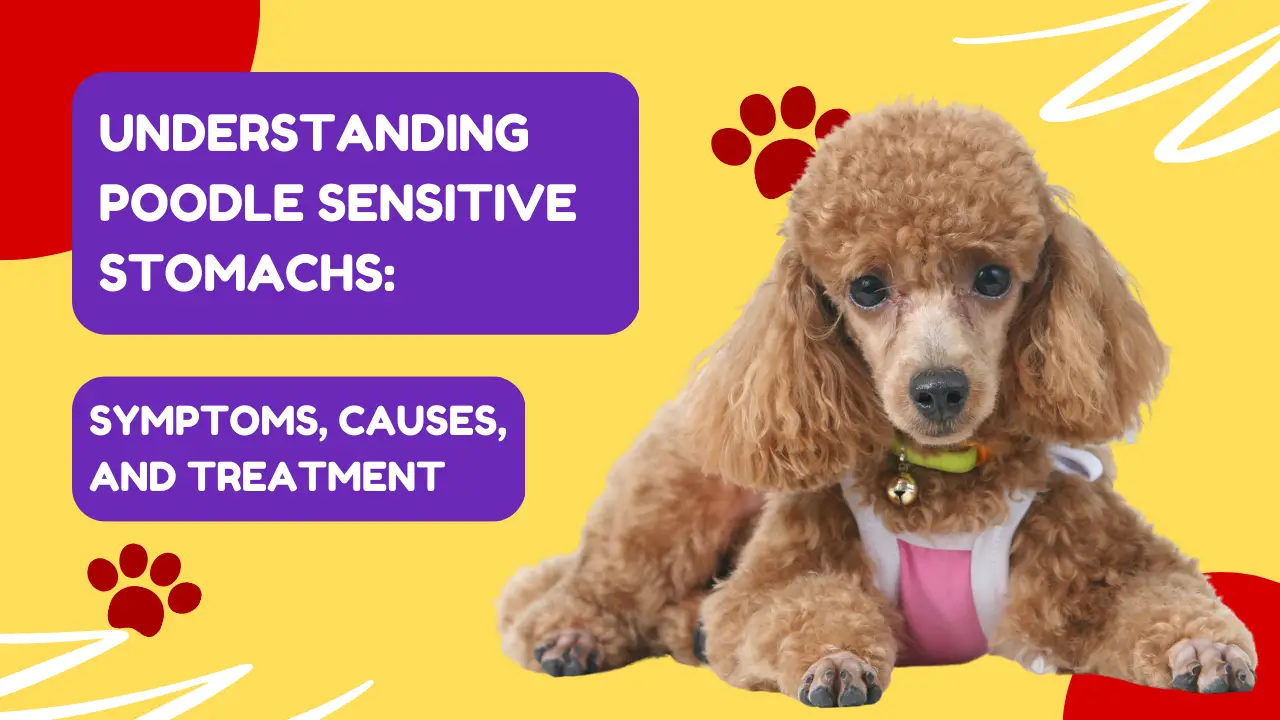
In this article, I will be discussing the common causes of digestive upset in poodles and treatments for a sensitive stomach, to help you keep your poodle healthy and comfortable.
What Will You Learn? 👇
What is a sensitive stomach in poodles?
Poodles are a breed of dog that is known to be prone to sensitive stomachs. This is where their digestive system gets upset by specific factors, including abrupt diet changes, stress, environmental factors, allergies, food sensitivities, and other things. A Poodle with a sensitive stomach often shows signs of vomiting, constipation, or diarrhea.

Read our Smart Poodles - Smart Tricks eBook for only $2.99
Dive into a treasure trove of engaging tricks and tips designed specifically for your poodle!
Causes of digestive upset in dogs
When a Poodle has an upset stomach, it could be due to various reasons. If you observe your Poodle every day, you’ll likely be able to spot their symptoms quickly. However, if you don’t spend a lot of time, they may be harder to detect. Some of the main triggers of these symptoms are the following:
Parasites and worms
The primary cause of digestive upset in poodles, especially pups, is intestinal parasites such as worms or protozoa that can cause a stomach upset. They’re often transmitted through food, from the mother during pregnancy or nursing, or from infected soil. To detect if your Poodle has parasites or worms, you’ll want them to get their stool checked by a vet for parasites.
Here’s a brief list of the different types of parasites and worms that commonly affect Poodles:
- Roundworms: Common intestinal parasite in dogs, including poodles. Puppies can get it from mother’s milk or infected feces. Adult dogs can get it by ingesting roundworm eggs in soil or other substances. Symptoms include vomiting, diarrhea, and weight loss.
- Hookworms: Intestinal parasite that attaches to the intestinal wall and feeds on the dog’s blood, causing anemia and other health problems. Puppies can get it from mother’s milk or infected feces. Adult dogs can get it by ingesting hookworm larvae in soil or other substances. Symptoms include vomiting, diarrhea, and weakness.
- Whipworms: Intestinal parasite that lives in the large intestine and can cause bloody diarrhea and weight loss. Dogs get it by ingesting infected feces or soil. Diagnosis can be difficult as eggs may not always be present in fecal samples.
- Tapeworms: Parasite that lives in the intestines of dogs, acquired by ingesting infected fleas or rodents. Symptoms include weight loss, vomiting, and diarrhea. Tapeworm segments may be visible in feces or around the anus.
- Heartworms: Parasite that lives in the heart and lungs and can cause serious health problems, including heart failure. Dogs get it through the bite of an infected mosquito. Symptoms include coughing, difficulty breathing, and lethargy.
Inflammatory bowel disease (IBD)
Inflammatory bowel disease (IBD) is a chronic condition that can affect the digestive system of poodles. The primary cause of IBD is an abnormal immune response in the intestinal tract, which can lead to consistent chronic inflammation of the gut lining. This stops food from being digested problem, affecting the large intestine and leading to serious health problems.
Several factors may contribute to the development of IBD, including genetics, environmental factors, overgrowth of inflammatory cells, stress, and diet. Diagnosing IBD can be challenging sometimes because its symptoms are common as other digestive disorders.
Food Allergies and intolerances
Food allergies and intolerances can be common causes of digestive upset in poodles. Sometimes they might be allergic to certain ingredients in their diet, such as grains, chicken, beef, or dairy products. This often happens when their immune system overreacts to a particular protein in the food. In this situation, poodles can experience mild to severe gastrointestinal symptoms.
| Common Allergens and Intolerances in Dog Food | Symptoms of Intolerance |
|---|---|
| Beef | Diarrhea, vomiting, skin rash, itching |
| Chicken | Diarrhea, vomiting, skin rash, itching |
| Dairy products | Gas, bloating, diarrhea |
| Corn | Vomiting, diarrhea, skin rash, itching |
| Wheat | Vomiting, diarrhea, skin rash, itching |
| Soy | Vomiting, diarrhea, gas, bloating |
| Eggs | Vomiting, diarrhea, skin rash, itching |
| Artificial preservatives | Diarrhea, vomiting, gas |
| Artificial colors | Diarrhea, vomiting, gas |
| Artificial flavors | Diarrhea, vomiting, gas |
Eating non-food items
As poodles are known to be playful and curious dogs, they can sometimes eat non-food items. Some of these items could be socks, toys, and other items. For Poodles, this behavior is known as pica and can lead to digestive tract blockage. When poodles cannot ingest a non-food item, it can get stuck in their digestive tract, causing a severe blockage which can be risky for them to live and often require surgery to remove the object.
Stress
If your Poodle is stressed, their digestive system might be impacted. For instance, if your Poodle has experienced a change of environment or routine, received a lack of attention, or anything else, they might produce more cortisol. Cortisol is an important hormone that impacts digestion, decreasing the appetite, and increasing stomach acid, causing acid reflux and digestive problems, pancreatitis, and diarrhea.
Symptoms of a sensitive stomach in dogs
The symptoms of a sensitive stomach in dogs can vary depending on the cause and severity of the condition. To give you a better idea, here are some common symptoms to look out for:
Vomiting
One of the biggest red flags when Poodles have a sensitive stomach, is vomiting. Often vomiting is just an acute matter and usually happens only once within 24 hours. If this happens, it’s often the case of a stomach bug or spoiled food. However, if it happens for longer, it may be a sign of gastrointestinal issues, and you may need to see a vet.

Weight loss
An equally important sign to watch out for is weight loss. If your Poodle is suffering from chronic digestive issues, their food absorption and intake of nutrients might be impacted. As a result, they can often experience malnutrition and weight loss.
Abdominal Pain
Another major symptom of stomach upset in poodles woulds be abdominal pain or discomfort. A common cause of pain would be a blockage, however, abdominal pain can also be caused by other factors, such as gut inflammation, pancreatitis or infections. So you must watch out for other symptoms!
Diarrhea
Dietary changes can upset a poodle’s stomach, making them have loose stools or diarrhea. Some of this can result from a change in diet, stress, eating spoiled food, ingesting toxins, and more. We may also see fresh red blood or mucus (slime) in the stool.
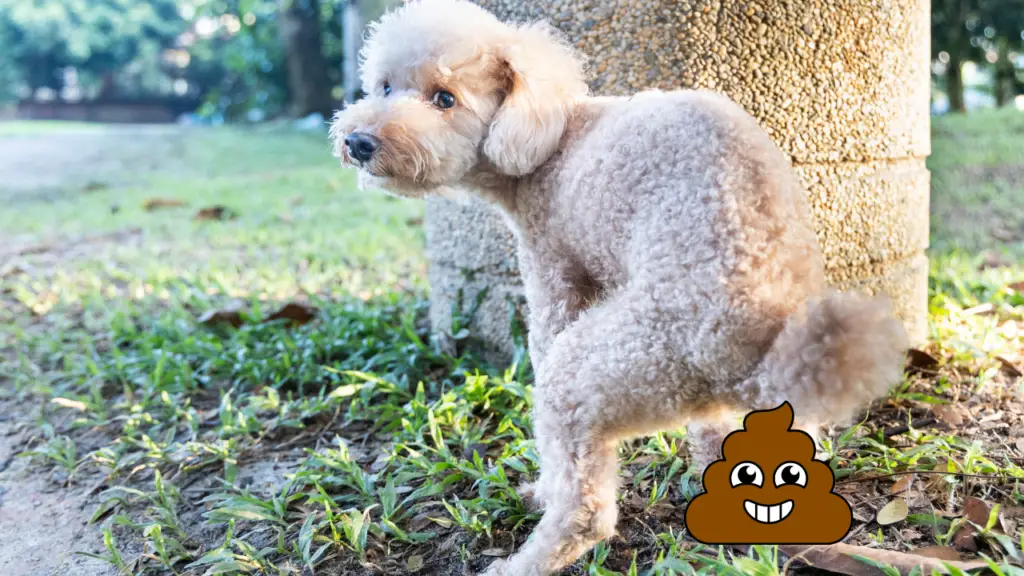
Mucus in the stool
Often when a dog has an upset stomach, you may find a substantial amount of mucus in its stool. This is because mucus is used to lubricate the colon and help move stool along the intestines. However, if they have a sensitive stomach, the mucus production increases.
Constipation
Often constipation can be a major sign of stomach issues. A Poodle with a sensitive stomach may strain more when going to the bathroom or have infrequent stools every 1-3 days instead of their normal 1-2 times a day.
Lack of appetite
A major sign of a sensitive stomach in Poodles is when they lose interest in food, eat less, or don’t even eat. Often when their stomach is sensitive, it can cause them to experience discomfort, nausea, or pain, reducing their motivation to eat.
If your Poodle is experiencing any of these symptoms, it is essential to consult with your veterinarian to determine the cause.
Are Poodles Prone to Sensitive Stomachs?
Overview of Poodle’s digestive health
When discussing the topic of a Poodle’s sensitive stomach, it often depends on their genetics and the environment they are raised in. If you own a poodle, there is a good chance they will have a sensitive stomach at some point in life.
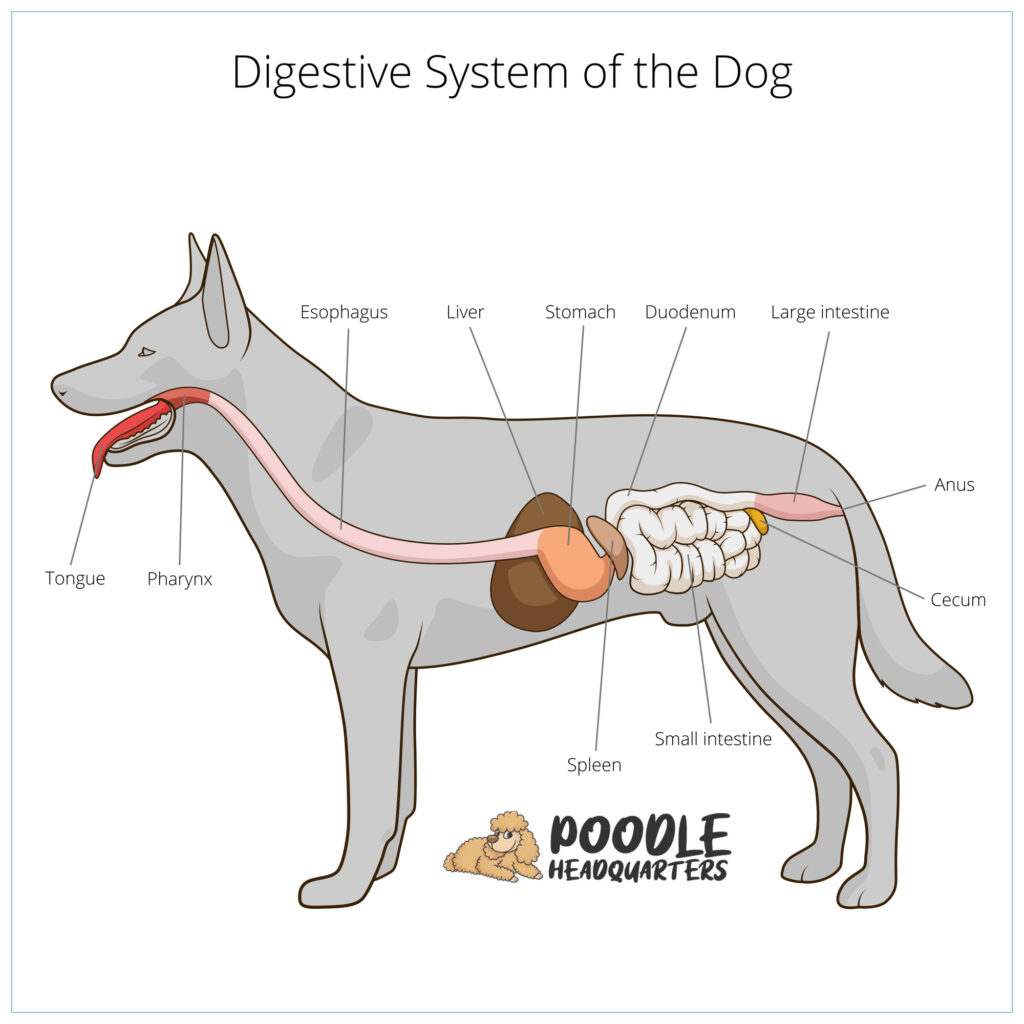
One of the most common reasons for sensitive stomachs is that they might have an underlying health condition. Some conditions that can contribute to this are Inflammatory Bowel Disease, Diabetes, Addison’s disease, Cushing’s disease, chronic pancreatitis, and more.
Some pedigrees often have delicate stomachs and may need prescription food to keep their stomach in good condition. Ultimately, feeding a good quality diet that is easily digestible and free from harmful ingredients can support a poodle’s digestive health.
Factors that may contribute to sensitive stomachs in poodles
Several factors may contribute to a sensitive stomach in poodles. Some of them are:
Diet
A significant factor contributing to poodles’ sensitive stomachs is their diet. Poodles with sensitive stomachs are often intolerant to a particular food, and ingredients such as grain, chicken, beef, or dairy cause digestive problems. Additionally, sudden changes in diet or feeding, such as switching one food product to another, can upset poodles’ digestive system.
Age
As poodles age, several changes occur to their digestive system, making them more prone to digestive issues. Older poodles have difficulty digesting certain foods or absorbing nutrients properly, leading to a sensitive stomach. An older poodle may also become less active, meaning their gut slows down and food takes longer to digest.
Irritable Bowel Syndrome
Irritable bowel syndrome – IBS is also a contributing factor to sensitive stomach poodles. IBS is a functional disorder that affects the intestinal tract making it sensitive. Poodles with IBS experience flare-ups triggered by specific food changes in their routine.
Genetics
Genetics plays a vital role in contributing to poodles’ sensitive stomachs. Some poodles have genetic predispositions to certain digestive conditions like inflammatory bowel disease and food allergies that can cause stomach sensitivity. It is worthwhile checking if mum or dad suffer with chronic GI issues, before considering the purchase of a pedigree poodle pup.
Medications
Medications such as antibiotics can also contribute to sensitive stomachs in poodles and cause digestion problems and gastrointestinal upset. These antibiotics disturb the balance of good bacteria in the gut, which leads to digestive issues in poodles. This can usually be counteracted by providing a good quality probiotic alongside the antibiotic.
Stress
Stress can be another factor that may contribute to sensitive stomachs in poodles. As poodles are sensitive dogs, they suffer from stomach problems when they experience stressful situations because the poodle’s body releases stress hormones such as cortisol and adrenaline. These hormones impact the digestive system and cause the stomach to produce more acid, leading to digestive problems. Stress can come from various sources, including changes in routine, separation anxiety, fireworks outside or an unfamiliar situation.
Lack of fiber
Another reason might be a lack of fiber in your Poodle’s diet because fiber helps promote healthy digestion.
How to Identify and Treat a Sensitive Stomach in Poodles
If your Poodle is experiencing digestive issues, you need to take it to the veterinarian for tests and to gain a proper diagnosis to identify the problem. The veterinarian will perform several tests and then recommend medications. Some tests they may perform are:
Endoscopy
Endoscopy is a minimally invasive procedure performed by veterinarians to examine the digestive tract using a small camera and a light. This will help them to identify if there is something obstructive, inflammation, or blockage. At the same time, biopsies of abnormal looking tissue may be taken.
Ultrasound
This test will help the veterinarian identify the digestive tract’s blockages or abnormalities. It’s a non-invasive test that uses a gel and high frequency sound waves to view their internal organs. This is one of the first steps when it comes to investigating chronic GI disease.
Blood Test
A blood test will help the veterinarian identify the hidden health issues in your Poodle that might contribute to digestive issues such as liver disease, hormonal disorders or an infection. Specific ‘gastrointestinal’ blood profiles that measure things like TLI, Cobalamin and Folate should also be run.
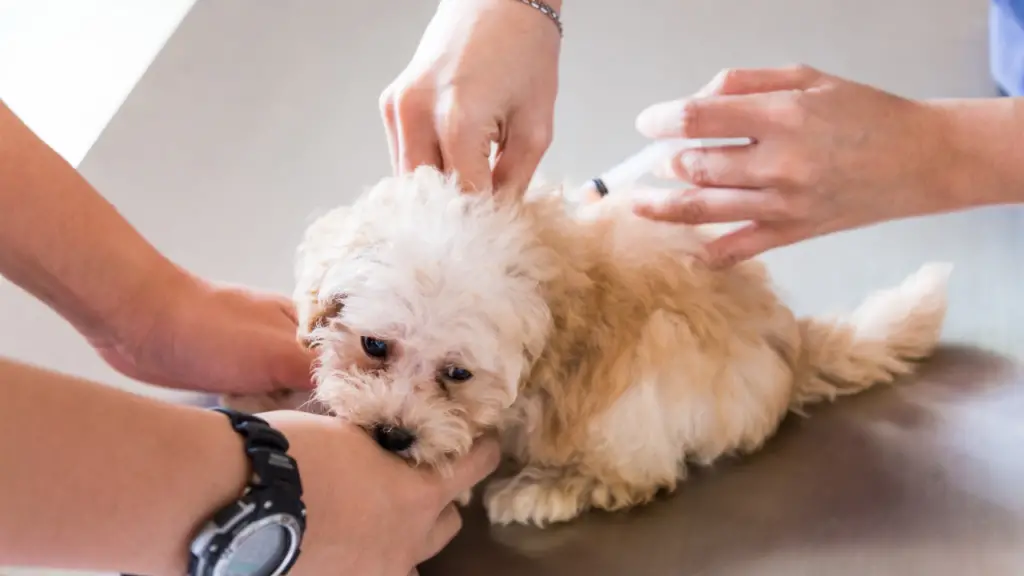
Fecal analysis
Fecal analysis helps the veterinarian identify parasites or bacterial infections causing digestive issues in your Poodle.
Once the veterinarian diagnoses the issue, he can recommend the appropriate treatment options.
Medical treatment options for sensitive stomachs in poodles
There are several medical treatment options available that veterinarians recommend that will help manage the sensitive stomach of your Poodle. Here are some specific medical treatment options.
Probiotics
Probiotics are beneficial bacteria that help improve gut health and digestion. Your veterinarian may recommend this treatment to help support the digestive system and reduce symptoms of stomach problems. It is clinically proven that providing antibiotics can shorten recovery time in poodles with acute diarrhea.
Digestive Enzymes
Digestive enzymes help your Poodle break down food more efficiently and make the digestive system easier to process. Veterinarians may recommend poodles with pancreatic insufficiency that affects enzyme production.
Anti-Inflammatory medication
Anti-inflammatory medication helps with inflammatory bowel disease or other diseases that cause digestive tract inflammation. If this is the case for your Poodle, your veterinarian might recommend anti-inflammatory medication to reduce inflammation and improve their digestive system.
Prescription diets
Prescription diets are especially recommended by a veterinarian that is specially formulated for poodles to meet the nutritional needs of dogs with specific health conditions.
Anti-nausea medication
A veterinarian recommends anti-nausea medication for poodles who have frequent vomiting or nausea. These medications help to reduce symptoms and improve the dog’s overall comfort.
Medical treatments are essential for your Poodle’s needs to overcome the stomach problem. With proper medical treatment and management, your poodles with sensitive stomachs can lead happy and healthy lives.
Home care and management strategies for digestive health in poodles
There are several home care remedies and management strategies that you can follow to help your Poodle’s digestive problem. These include:
Feeding high-quality food
A high quality and easily digestible diet full of fiber can help support digestive health. You’ll want to incorporate a diet that contains high-quality protein sources, low fats, and easily digestible carbohydrates.
Go for a walk
Try to take your Poodle on a daily walk after their meal. This will help them digest their food quickly to benefit from a calm and relaxed stomach.
Canned pumpkin
Most dogs have sensitive stomachs, and various medications are available, but they are not that effective. Canned pumpkin is one of those treatments that contain vital nutrients and minerals that can help your dog recover and also give them more fiber. When giving a Poodle canned pumpkin, you’ll want to start with a slow intake, then increase gradually and monitor the effects closely.
Water intake
Dehydration can mean a Poodle finds it harder to cope when they develop symptoms of a sensitive stomach. Adequate hydration is essential for overall poodle health. Make sure your Poodle has plenty of water daily to avoid frequent stomach problems. On average, they should be drinking around 50 mls/kg/day.
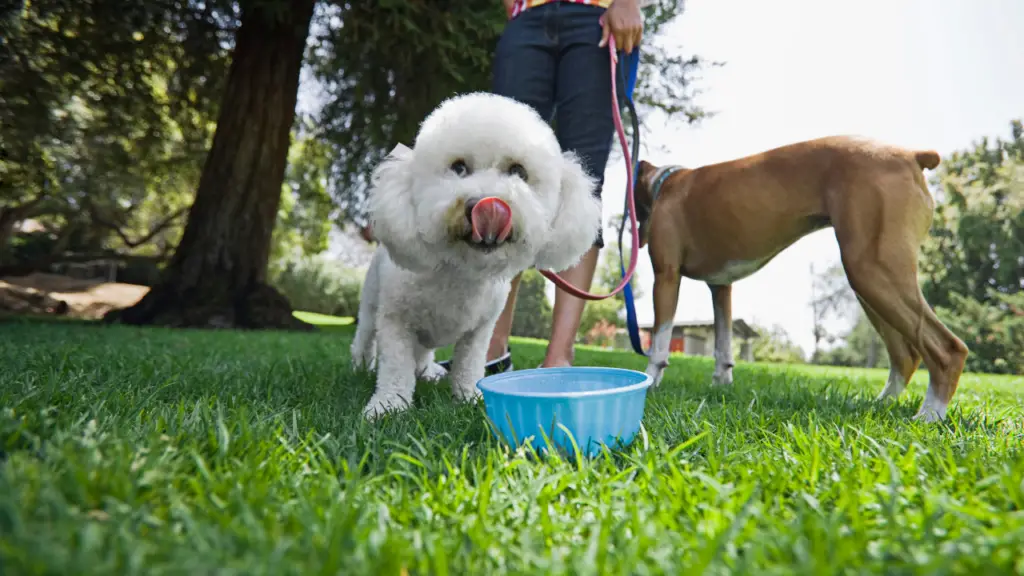
Feed small frequent meals
Make sure to feed your Poodle small and more frequent meals throughout the day. It can help your Poodle not to overload the stomach. Frequent meals will also ensure that the digestive system has time to break down and absorb nutrients properly.
Give them attention
Make sure to spend most of your time with your little Poodle. As they are a sensitive dog breed, their stomach gets upset when they feel a change to the behavior of their owner. Use training treats and commands to play with your Poodle. Try to take them out in the park, and to provide a variety of both mental and physical stimulation; these are smart dogs!
Marko is the founder and author at PoodleHQ, where he blends profound expertise with formal training in Animal Behavior and Canine Genetics. With multiple generations of poodles under his care, he’s a breed connoisseur, honored with the Canine Care Excellence Award and lauded by the International Pet Enthusiasts Association.

